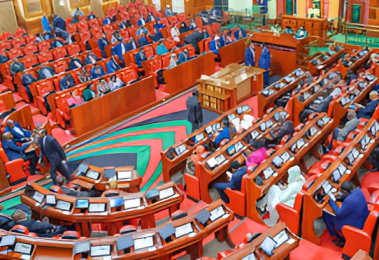MPs increase own budget to Sh48bn amid cuts to health, education

Kenya’s 2025–26 budget reveals a painful contrast between increased spending on Parliament and deep cuts across core public services, exposing the extent to which ordinary citizens are being asked to bear the burden of austerity.
The Budget and Appropriations Committee has approved a Sh48 billion allocation to Parliament, a Sh5 billion rise from the previous year, despite Treasury warnings of a funding crisis and an Sh876 billion deficit.
This increase comes even as health, education, policing, and university funding are either slashed or left unfunded.
The allocation breakdown includes Sh28.6 billion to the National Assembly, Sh8.2 billion to the Senate, Sh9.4 billion to Parliamentary Joint Services, and Sh2.8 billion to the Parliamentary Service Commission.
Meanwhile, key services have suffered. The Higher Education Loans Board is missing Sh17 billion for students enrolling in September, and the Teachers Service Commission has not received the Sh7.3 billion needed to convert 20,000 intern teachers into permanent staff.
Recruitment of police officers, insurance for law enforcement, and the hiring of village elders have also been frozen. The health sector’s budget faces a Sh70 billion gap, making it one of the hardest-hit departments.
Despite these sacrifices, the budget favours lawmakers and other senior government offices. The Office of the President will get Sh5.37 billion, up by Sh30 million.
The Deputy President’s office is allocated Sh3.07 billion, while the Prime Cabinet Secretary’s office will receive Sh866 million. State House maintains its Sh8.6 billion allocation.
The Treasury, which proposed Sh118 billion for itself, saw the figure slashed to Sh111 billion, further tightening its operations. Yet the same Treasury has warned that revenue shortfalls could threaten fiscal sustainability.
Lawmakers defended their budget hike, saying the funds would support oversight roles, improve constituency office services, and modernise Parliament operations.
The judiciary will get Sh27.8 billion, and the Office of the Auditor-General Sh8.7 billion. The Equalisation Fund will receive Sh9.6 billion.
Education remains the top-funded sector at Sh701 billion, although much of this is for routine capitation and infrastructure. The administration and invigilation of KCPE and KCSE exams have been allocated Sh6 billion.
The Energy, Infrastructure and ICT sector is the second-highest funded, with Sh500 billion for roads, housing, and energy. Roads got a boost to Sh199 billion, and housing will receive Sh119 billion.
Community health promoters are set to receive Sh3.3 billion. Kenya will spend Sh16.6 billion from the global fund for HIV, TB, and malaria, and Sh9.6 billion for international subscriptions.
The security sector is another major winner, receiving Sh264 billion. The Defence Ministry got Sh213 billion, including Sh13 billion more for new recruitment and operations in Somalia. The National Intelligence Service has been allocated Sh51 billion.
Sh8 billion has been allocated for fertiliser subsidies, with Sh2 billion each to revive the sugar and coffee sectors.
However, Sh233 billion in proposed projects remain unfunded, including Sh1 billion for new judges and Sh1 billion for the Auditor-General’s expanded audit roles.
Judges are set to receive a Sh700 million boost in emoluments. The Ethics and Anti-Corruption Commission has been given Sh130 million more for refurbishments and staff hiring.
The budget’s total has been reduced by Sh58 billion. Development expenditure dropped by Sh32 billion, which MPs warn could threaten key capital projects in health, infrastructure, and education. Still, recurrent expenditure will rise by Sh59 billion.
While development spending is projected to grow by Sh91 billion, MPs have cautioned that such allocations often don’t translate into real spending due to execution challenges.
The budget for county governments remains at Sh405 billion despite inflation and increasing service demand. Social protection programs have not seen any meaningful increase, and environmental initiatives such as the 15 billion tree plan remain underfunded.
To bridge the deficit, the government plans to borrow Sh592 billion locally and Sh284 billion from international lenders.
